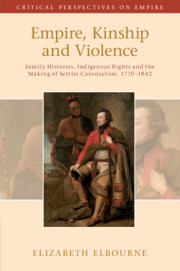 Empire, Kinship and Violence
Empire, Kinship and Violence Book contents
- Empire, Kinship and Violence
- Critical Perspectives on Empire
- Empire, Kinship and Violence
- Copyright page
- Contents
- Figures
- Maps
- Acknowledgements
- A Note on Nomenclature
- Abbreviations
- Introduction
- Part I North America
- Part II Upper Canada, New South Wales, Van Diemen’s Land, Victoria, Western Australia, the Cape Colony, Sierra Leone
- Part III Britain, the Cape Colony, West Africa
- 8 Colonial Sins and Priscilla Buxton’s Quest for Virtue
- 9 Keeping Colonialism in the Family
- Conclusions
- Bibliography
- Index
9 - Keeping Colonialism in the Family
Kinship, Humanitarianism and the Niger Expedition
from Part III - Britain, the Cape Colony, West Africa
Published online by Cambridge University Press: 15 December 2022
- Empire, Kinship and Violence
- Critical Perspectives on Empire
- Empire, Kinship and Violence
- Copyright page
- Contents
- Figures
- Maps
- Acknowledgements
- A Note on Nomenclature
- Abbreviations
- Introduction
- Part I North America
- Part II Upper Canada, New South Wales, Van Diemen’s Land, Victoria, Western Australia, the Cape Colony, Sierra Leone
- Part III Britain, the Cape Colony, West Africa
- 8 Colonial Sins and Priscilla Buxton’s Quest for Virtue
- 9 Keeping Colonialism in the Family
- Conclusions
- Bibliography
- Index
Summary
This chapter examines the sponsorship by the politically powerful Buxton family of the disastrous Niger expedition, which sought to harness medical advances, new geographic knowledge and the power of steamships, to send three steamships down the River Niger to negotiate treaties with African chiefs whereby chiefs would agree to end the slave trade and in return receive trade boats from Britain. Secretly, the expedition was also supposed to purchase territory and lay the foundations for a cotton plantation funded by British investors. The chapter examines the extent to which the expedition was a family enterprise, as well as exploring the ideological assumptions of the expedition, opposition to it, and the importance of the marriage between humanitarianism and colonialism that it represented. The failure of the expedition marked a turning point in the power of abolitionist families. For example, the expedition was opposed by Chartist activists in the name of popular power and opposition to the focus of elite families on suffering others overseas rather than on the British poor. Debate over the Niger Expedition thus presaged the growth of settler populism, and marked an important turning point in the history of empire, kinship and violence told by this book.
Keywords
- Type
- Chapter
- Information
- Empire, Kinship and ViolenceFamily Histories, Indigenous Rights and the Making of Settler Colonialism, 1770-1842, pp. 348 - 371Publisher: Cambridge University PressPrint publication year: 2022
